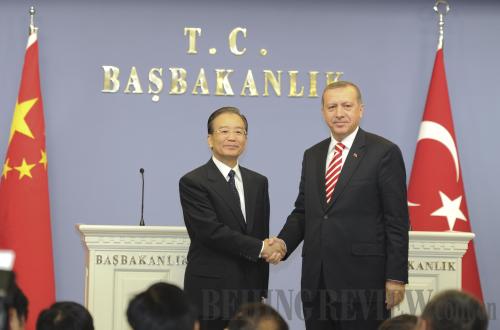|
 |
|
STRATEGIC PARTNERS: Chinese Premier Wen Jiabao attends a press conference with Turkish Prime Minister Recep Tayyip Erdogan in Ankara on October 8 (XIE HUANCHI) |
When bilateral trade cooperation is enhanced, trade disputes also tend to increase. Wan suggested that negotiation, consultation and arbitration, rather than trade war, should be used to settle disputes.
During Wen's visit to Turkey, the two sides agreed to establish a "strategic relationship of cooperation," in a bid to upgrade the level of friendly cooperation in all fields. Wen and Turkish leaders reached consensus on further boosting cooperation in fighting terrorism, separatism and extremism, while vowing to work together to safeguard the two countries' sovereignty and territorial integrity.
China and Turkey also agreed to improve economic and cultural cooperation. The two sides signed eight documents, covering economy and trade, railways, power plants, telecommunications and infrastructure construction. China is also encouraging Chinese enterprises to increase investment in Turkey.
Ma Zhengang, former Chinese Ambassador to the UK, said a boost in cooperation will benefit both sides. Located between Asia and Europe, Turkey hopes to use its geographic advantage to play a bigger role. "Today, developing cooperation with China is a good way for Turkey to enhance its strength, in both political and economic ways," Ma said.
He said by establishing a strategic relationship, China and Turkey can improve trust in each other, which is of great significance to deepening their relationship. Ma stressed given Turkey's important location, an improved Sino-Turkish relationship will help promote the China-EU relationship in the future.
Addressing concerns
During Wen's tour, the exchange rate of the renminbi was a focus. Some EU officials insisted the renminbi had been undervalued, and should further appreciate. Wen said on October 6 the EU should not force an appreciation of the renminbi. He said the renminbi's real effective exchange rate has appreciated 55 percent since 1994, while other main currencies, such as the dollar, continue depreciating. Since 2005, the dollar's exchange rate to the renminbi has depreciated 22 percent.
Ma thinks the renminbi appreciation issue has deeper explanations. First, China has emerged from the financial crisis and its economy has recovered, while Europe and the United States have not yet recovered. "They didn't repent their mistakes seriously, but intend to make China their scapegoat," Ma said.
Second, some governments attempted to divert attention from their ineffective economic policies by playing up the renminbi's exchange rate factor. The Chinese economy contributed about 50 percent of the global economic growth last year. If China's economy slides, the whole world, including the United States and Europe, will be negatively influenced. "Unlike governments, economists, including U.S. and European economists, don't think the renminbi's exchange rate is the main reason for Western countries' unemployment and decreasing exports," Ma said.
Zhou Shijian, a senior fellow with the Center for China-U.S. Relations at Tsinghua University, said the exchange rate issue was actually borne of U.S. selfishness. The U.S. economic recovery slowed in the summer of this year. But Barack Obama promised in his State of the Union address in January to double U.S. exports within five years. So the U.S. Government must find a way to share the market with major exporters, like Germany, China and Japan, said Zhou, adding that the United States must depreciate the dollar at least 30 percent to reach such a goal.
"The Obama administration hurries to print more banknotes while accusing others of manipulating the exchange rate. This is the biggest obstacle to the recovery of the world economy," he said.
The EU's arms embargo against China was another focus during Wen's tour. Although many EU members, like France, the Netherlands and Spain, have called for an end to the embargo in recent years, the issue hasn't been settled yet.
Ma said there are three factors at work: concerns over China's growing strength, a feeling of loss in light of China's rapid ascension on the world stage and U.S. influences.
Professor Meng Xiangqing from the People's Liberation Army's University of National Defense said political considerations are the biggest obstacle to the removal of the embargo. Moreover, it is very difficult to gain the approval of all 27 members of the EU, he added.
However, both Ma and Meng pointed out that removal of the embargo will not only boost political trust between China and the EU, but will also bring economic benefits to the EU.
Currently, a number of EU nations face sovereign debt crises. In several European nations, like Greece, Italy and Belgium, national debts have exceeded the GDP. Economists predict the fiscal deficit of the whole euro zone may exceed 7 percent of its total GDP. Arms exports can help the EU solve unemployment issues, while helping its economy emerge from the financial crisis, the experts said. | 